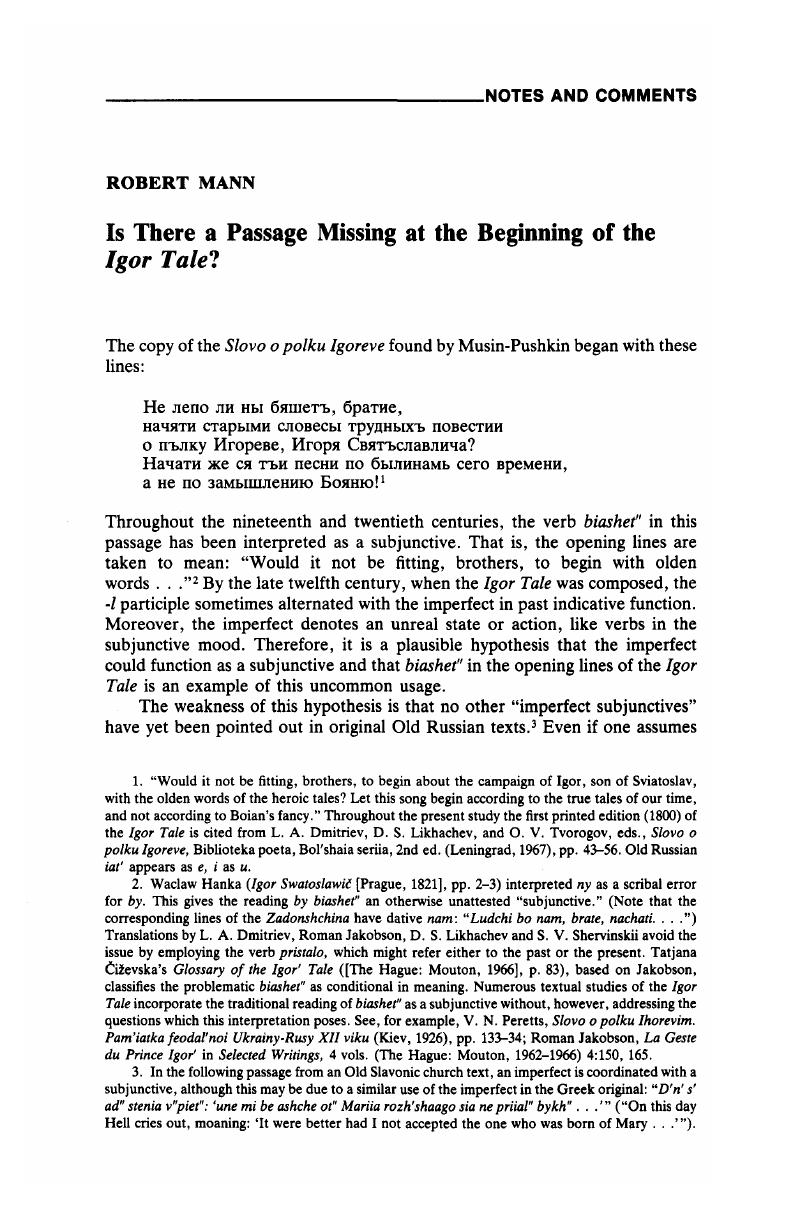No CrossRef data available.
Published online by Cambridge University Press: 27 January 2017

1. “Would it not be fitting, brothers, to begin about the campaign of Igor, son of Sviatoslav, with the olden words of the heroic tales? Let this song begin according to the true tales of our time, and not according to Boian's fancy.” Throughout the present study the first printed edition (1800) of the Igor Tale is cited from Dmitriev, L. A., Likhachev, D. S., and Tvorogov, O. V., eds., Slovo o polku Igoreve, Biblioteka poeta, Bol'shaia seriia, 2nd ed. (Leningrad, 1967), pp. 43–56 Google Scholar. Old Russianiat’ appears as e, i as u.
2. Hanka, Waclaw (Igor Swatoslawii [Prague, 1821], pp. 2–Google Scholar) interpreted ny as a scribal error for by. This gives the reading by biashet” an otherwise unattested “subjunctive.” (Note that the corresponding lines of the Zadonshchina have dative nam: “Ludchi bo nam, brate, nachati… .“) Translations by L. A. Dmitriev, Roman Jakobson, D. S. Likhachev and S. V. Shervinskii avoid the issue by employing the verb pristalo, which might refer either to the past or the present. Ciievska, Tatjana's Glossary of the Igor’ Tale ([The Hague: Mouton, 1966], p. 83 Google Scholar), based on Jakobson, classifies the problematic biashet” as conditional in meaning. Numerous textual studies of the Igor Tale incorporate the traditional reading of biashet” as a subjunctive without, however, addressing the questions which this interpretation poses. See, for example, Peretts, V. N., Slovo o polku Ihorevim. Pam'iatka feodal'noi Ukrainy-Rusy XII viku (Kiev, 1926), pp. 133–34 Google Scholar; Roman, Jakobson, La Geste du Prince Igor’ in Selected Writings, 4 vols. (The Hague: Mouton, 1962-1966) 4:150, 165.Google Scholar
3. In the following passage from an Old Slavonic church text, an imperfect is coordinated with a subjunctive, although this may be due to a similar use of the imperfect in the Greek original: “D'n’ s' ad” stenia v“piet“: ‘une mi be ashche ot” Mariia rozh'shaago sia nepriial” bykh“…'” (“On this day Hell cries out, moaning: ‘It were better had I not accepted the one who was born of Mary …'“). Nikolai, Karinskii, Khrestomatiia po drevne-tserkovno-slavianskomu i russkomu iazykam. Chasf pervaia. Drevneishie pamiatniki, 2nd ed. (St. Petersburg, 1911), p. 112 Google Scholar.
4. The verb biashet” in Iaroslavna's exhortation to the wind can best be interpreted as a normal imperfect: “Malo li ti biashet” gor” pod” oblaky veiati” (“Were there too few mountains for you to waft up under the clouds?“).
5. Dmytro, Abramovich, ed., Kyevo-pechers'kyi pateryk (Kiev, 1930), leaf 157b., p. 137 Google Scholar.
6. See, for example, A., Vostokov, ed., Ostromirovo Evangelie 1056-57goda (St. Petersburg, 1845), pp. 119d, 161cGoogle Scholar. See also note 3.
7. Cited from Adrianova-Peretts, V. P., Slovo o polku Igoreve i pamiatniki russkoi literatury Xl-Xlll vekov (Leningrad, 1968), pp. 47–48 Google Scholar.
8. Ibid.
9. The Zadonshchina is cited from L. A. Dmitriev, R. P. Dmitrieva, D. S. Likhachev, Slovo o polku Igoreve ipamiatniki KuUkovskogo tsikla (Moscow and Leningrad, 1966), pp. 535-56. Copy U is cited here. In copy 1-2 the first half of the tale is missing. Copies Zh and K-B do not contain the lines corresponding to the opening lines of the extant version of the Igor Tale, although both contain allusions to the Kiev Hills in their introductory sections. Copy 1-1 reads as follows: “Rtsi, togo lutche bo es(t’), brate, nacha povedati inemi slovesy . . .“; copy 5: “Skazhi mi, brate, koli imy slovesy … .“
10. For a brief survey of wedding imagery in the Igor Tale see Robert, Mann, The Song of Prince Igor: Russia's Great Medieval Epic (Eugene, Oregon: Vernyhora Press, 1979)Google Scholar.
11. See The Song of Prince Igor, pp. 44—45.
12. Dmitriev, et al., pp. 466-67.
13. Obnorskii, S. P. (Ocherki po istorii russkogo literaturnogo iazyka starshego perioda [Moscow and Leningrad, 1946], p. 165 Google Scholar) argues that “trudnykh” povestii” is the object of the verb nachiati and appears in the partitive genitive. Jakobson (pp. 216-17) attributes the use of the genitive to the use of ne in “Ne lepo li ny biashet”… .” Another reading is possible if one takes povestii to be adnominal to slovesy: “Was it not fitting, brothers, for us to begin about the campaign of Igor, Igor Sviatoslavich, with the old words of the heroic tales?“
14. Cited from Jakobson, p. 106.